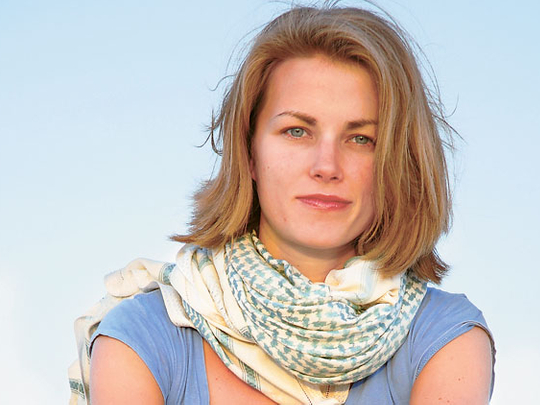
Rosie Garthwaite is no stranger to war zones and dangerous places. At the age of 22 she headed straight into the thick of things and became the only blonde in Basra, working at first for the English newspaper the Baghdad Bulletin. As the only permanently based Western journalist in the area, she then began to use her expertise in the area to freelance for the BBC, Reuters and The Times.
After a short stint living in Baghdad, she landed an internship at the BBC in 2004 which she then traded up into a job as a researcher and producer before leaving to join Al Jazeera in Doha in 2006.
In between her day job as the producer and presenter for Al Jazeera, Garthwaite has put together the ultimate survival guide for journalists working in war zones. How to Avoid Being Killed in a War Zone is a practical guide listing everything you need when based in a dangerous place — from surviving kidnapping to relationship advice.
For eight months Garthwaite researched and interviewed a wide range of people who have lived their lives in and out of war zones, piecing together a series of anecdotes and bits of advice that offer a revealing glance of close shaves and dangerous encounters.
"The hardest part was I got so many bits of conflicting advice and I wanted to include both sides. It's about creating a balance and where you don't come down one side or the other. You're just leaving it for the readers to take that information and decide what they're going to do," Garthwaite said.
One example she cites is the argument as to whether you should blend in or stand out. "If you're of a racial creed, it's going to be more difficult/easy depending on where you are in the world. People argue whether you should grow or shave your beard, buy local dress or not buy local dress," she said.
An issue she does stamp down on, though, is whether to carry a gun for protection. "If you're carrying a gun and you're in a war zone, then under the Geneva convention you're considered a mercenary. That means, if you are captured, then you're no longer a journalist. There are a lot of Arab journalists who have said they want to arm themselves and I've persuaded them not to if I want to travel with them," she said.
As the first female writer to have written a survival guide, she appeals not only to those looking for basic survival tips, but to the increasing number of women who find themselves in dangerous places for work. "The book has a big female perspective when it comes to the exercise, food, love and sex. These are things which are not included in the SAS handbook or the normal guides you read out there," Garthwaite said.
Garthwaite has had her fair share of hairy moments to share in the book. She recalls a time when she was in an internet café in Basra trying to download stories when someone came in from the street saying there was going to be an attack on the shop because she was there. Another incident involved a taxi driver who, after yelling at her for being British and a journalist, revealed that he knew where she lived. The final straw came two weeks after she left the country, when she found out that her old house had been raided and her housekeeper, Abbas, had been kidnapped in place of her.
"I've made lots of mistakes in the past. I always believed I should be in the middle of the action, not outside the action. I believed if I had done something before, I could do it again. I chose to stand out rather than blend in. If I were to go back and do the same things, I'd probably be a bit more cautious. But at the same time, I probably wouldn't have followed up on a lot of stories that I did. The great thing about naivety is you follow your heart," Garthwaite said.
It was because of her act-first-think-later attitude that she landed her first exclusive, uncovering the murder of Baha Mousa, a 26-year-old Iraqi hotel receptionist who was tortured under British custody in 2003.
From her past experiences, she has learnt to never take safety for granted. "If you start to take your safety for granted, that's when you're in a bad position. Last year I went to South Africa for a month. I spent my whole time in the townships and after three weeks I got a bit relaxed and was robbed. It was really stupid because I shouldn't have had cash or equipment on me," she said.
The survival guide comes at a time when it is becoming increasingly dangerous for journalists reporting from a war zone. "I remember going to the museum in Vietnam — during the ten-year war, 65 journalists were killed. I thought that it's a lot of people killed for just trying to do their job," she said. More recently, in 2011 alone, 66 journalists were killed, according to Reporters without Borders.
"There are more people out there and so many different mediums. Because they can't control the information coming out in the way they used to be able to, governments have to control the people. Even if that means throwing them in jail and hurting them," Garthwaite added.
The book appeals not only to war journalists but also to travellers, the army and even families living in dangerous places.
"When I go to book signings, I meet people of all ages. The youngest was a 9-year-old Iraqi girl, the other was a Pakistani mother from the Northwest Frontier. They all say they find it so useful and send it to their family," Garthwaite said.
"The book is also useful for travellers. For instance, you could be on holiday in Syria, one of the most popular holiday destinations in the Middle East, and then could find yourself stuck in the middle of a revolution. You could be in Thailand on the beach and you could be hit by a tsunami," she added.
The top advice she would give someone looking to go into a war zone? Do your research, never underestimate the power of local knowledge and always wear a seatbelt.
Rosie Garthwaite will be appearing at the Emirates Airline Festival of Literature, to be held from March 6 to March 10 at the InterContinental Hotel, Dubai Festival City and the Cultural and Scientific Centre, Al Mamzar.








